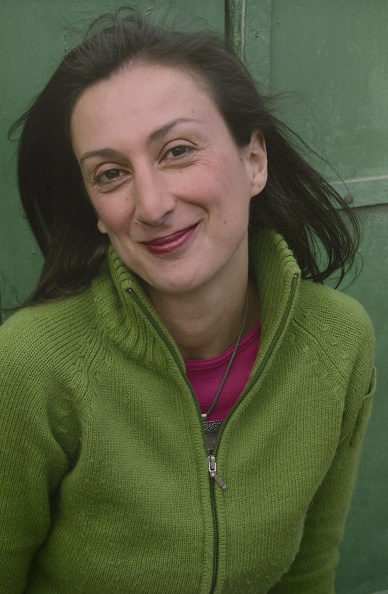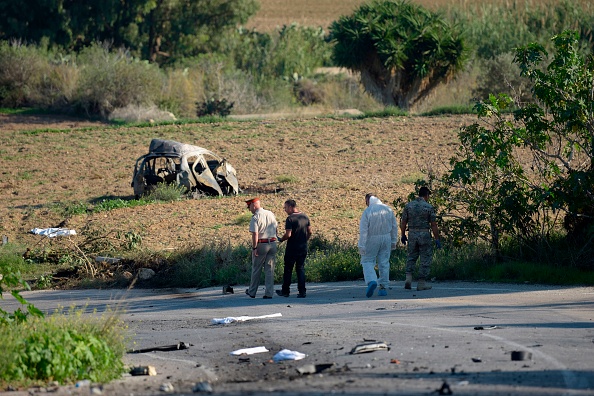Four years ago, Malta was shocked into silence by the car bomb assassination of its most prolific investigative journalist, Daphne Caruana Galizia. Now, some of the journalists carrying on her work say they face the same intimidation used against Daphne in the years leading up to her murder.
Investigative journalist and blogger Manuel Delia has been a key figure in the fight to put Daphne’s killers behind bars. He says press freedom in Malta remains on a knife’s edge.
“We are in exactly the same place today that we were four, five years ago when Daphne was killed,” Delia says, as he sits in a small office in Leipzig, Germany.
Caruana Galizia’s work uncovering murky government deals, suspected corruption and political intrigue captured the imagination of most Maltese. Her daily online blog, Running Commentary, would often garner as many readers as Malta counted citizens – some 400,000 daily. But her writing also earned her powerful enemies.
Since her death, Delia’s work has come to focus on those accused of ordering and carrying out her assassination as she drove her car from the family’s rural home in the small village of Bidnija.

Murdered Maltese investigative journalist Daphne Caruana Galizia. Credit: Dan Kitwood/Getty Images
Delia says he, too, has now become a target.
“I've been working on this story for about four years and there were heavy times, but last summer I ended up under siege. I had my email accounts spoofed undermining the stories that I was working on and supposedly confessing that I'm a bit coo-coo,” he says.
“My website was spoofed and that was a problem for my credibility. And then I started getting harassment phone calls, messages, just a constant siege of pressure.”
“The police were being called by someone to pretending to be me in the middle of the night, telling them 'come quickly to my house because someone's here to kill me'. Obviously, a complete fiction, but intended for the police to knock on the door of my house, wake up my children and tell them, ‘Where's your father? He said someone's trying to kill him.’”

Investigative journalist and blogger Manuel Delia has had to leave Malta for his own safety.
Manuel installed CCTV cameras around his home and instructed his children to be mindful of the conversations they had at school. But it did little to prevent the harassment.
Manuel’s wife, who is also an activist, was abused and attacked in broad daylight on Malta’s busiest street as she stood at the memorial site for the slain journalist.
Delia was forced to flee Malta in October last year and was accepted into a fellowship program for journalists in trouble run by the European Centre for Press and Media Freedom in Leipzig. The program has provided him respite from the abuse in Malta, as well as a small stipend, training and therapy.

The wreckage of Daphne Caruana Galizia's car following the explosion that killed her. Credit: STR/AFP via Getty Images
“Look Malta is a country where a journalist has been killed and ignoring that is silly. I can't do that,” Delia said.
“I think there's an appreciation that journalists need cross-border help because they're dealing with cross- border problems.”
Threats against journalists in Europe have increased in recent years, with mafia-style hits carried out on Slovak journalist Jan Kuciak in 2018, Giorgos Karaivaz, who was gunned down in Athens in 2021, and Dutch crime journalist Peter R. de Vries, who was shot in the head in Amsterdam last year – among others.
Reporters Without Borders says around 20 Italian journalists live under permanent police protection, while in Bulgaria, journalists often face attacks and physical threats.
Journalists accused of being traitors
The country’s two main political parties – the ruling Labour Party and opposition Nationalists – both own their own TV networks, which stick to the party line and often savagely attack opposition figures and unsympathetic journalists. In a country with a long history of foreign occupation, there are strong narratives around treason and collaborating with the enemy. The word 'traitor’ is often thrown at journalists seen to be attacking the government or who portray the country as anything other than a sunny holiday destination.

The sister of Daphne Caruana Galizia, Corrine Vella, with Daphne's son Matthew.
“Before I left Malta, Prime Minister Roberta Abela said the sort of threats Manuel Delia is getting are unacceptable and I appreciated that publicly,” Delia says. “But I also said, prime minister, can you please get your own television station to stop speaking of me as if I'm a traitor, as if I'm someone that cannot be believed.
“It's not just about discrediting journalists, it's about discrediting magistrates, investigators, police officers, Daphne's family.”
“Also, there are crazy people. So if your credibility and your dignity is undermined enough, there will be people who think they're being heroes if they hurt you.”
But Delia says his resolve remains strong and he’s adamant he’ll continue Daphne’s work until her killers are behind bars. He’s urged the Maltese government to adopt the recommendations of a public inquiry last year which found the Maltese state ultimately responsible for allowing the conditions which led to her murder. The findings called for institutional and judicial reform, more protection for journalists and greater obstacles to mafia intrusion.
“I think if we fail to bring justice to Daphne in her murder case, it sends a message to future generations that here a journalist can be killed, " Delia said.
"And not only does nothing happen, but she gets killed for nothing, her work was in vain because, although she risked her life and lost it in the process of sharing the truth with us, this state just didn't move. I think it will be a moral crisis we'll never recover from.
“The rest of the world will continue to think of us as a country that is unable or unwilling to deal with the rot within it. And what it will also say is that too many within us don't care about that.”


